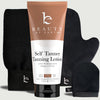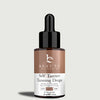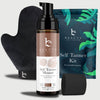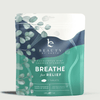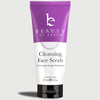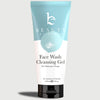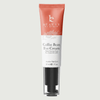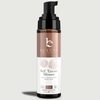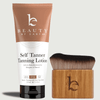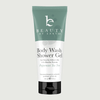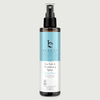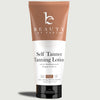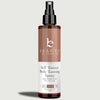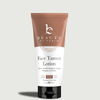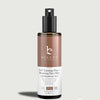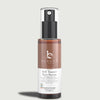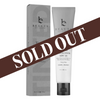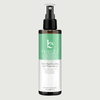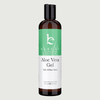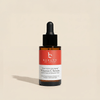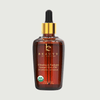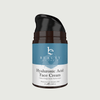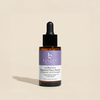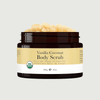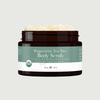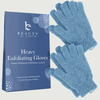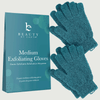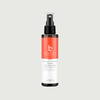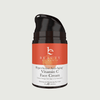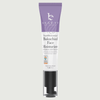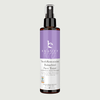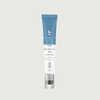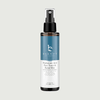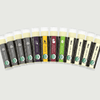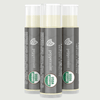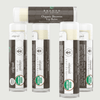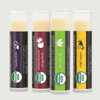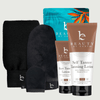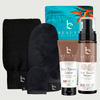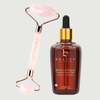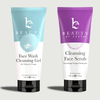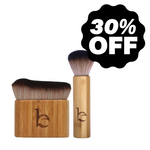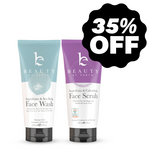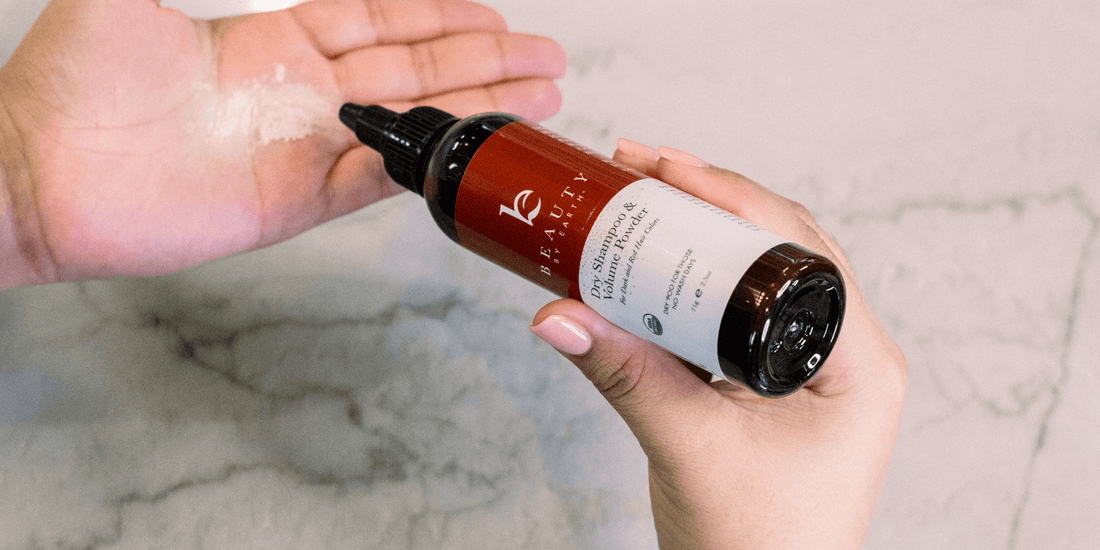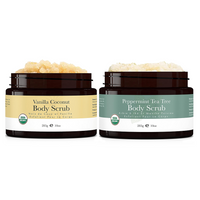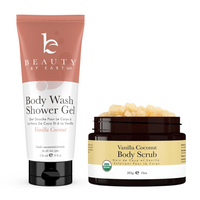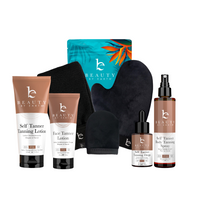You're on the run, late for school, late for work, just basically running late in all directions. And you just don't have time to wash your hair. But hold up, before you grab that spray dry shampoo. While aerosol spray dry shampoos are so easy to use, their charm falls flat when you read the ingredients label. These suckers contain questionable, potentially harmful ingredients that you don't want anywhere near your head! Butane, Propane, and Aluminum = YUCK! Dive in with Prudence Millsap as she gives you the dirty truth about Spray Dry Shampoos' toxic ingredients.
Stay safe and opt for a natural powdered organic dry shampoo. You'll find it custom-crafted for both light and dark hair colors. True, it's not quite as easy to apply as an aerosol spray dry shampoo, but we've got a trick that makes it easy peasy!
Pssst: If all this "toxic" talk is getting you stressed, jump down to our note on why/how we use the term.
Toxic Ingredients Commonly Found in Spray (Aerosol) Dry Shampoos
Conventional aerosol dry shampoos are anything but safe. Here are just some of the nasty stuff you’ll find in them:
Toxic Ingredient #1: Propane
Propane is a colorless, odorless gas that is derived from petroleum or natural gas. It is used as an aerosol propellant, meaning, it's what helps spray the product.
It has associations with non-reproductive system organ toxicity, irritation, and allergies. Not fun!
Toxic Ingredient #2: Butane
Butane is a lot like propane, with minor differences in pressure, boiling point, etc. It's incorporated into dry shampoos as yet another propellant to get that concentrated spritz.
However, it's definitely not great to use either. The Environment Canada Domestic Substance List classifies the chemical as a high human health priority as well as expected to be toxic or harmful, reported by the EWG.
Toxic Ingredient #3: Aluminum
Aluminum is a heavy metal that's toxic to the body and can be poisonous when accumulated in your soft tissue. While some heavy metals are essential minerals for the body, they are assimilated in VERY small amounts (think zinc, chromium, manganese, and iron).
Too much of them can lead to heavy metal poisoning resulting in headaches, sickness, abdominal pain, organ failure, and can also cause "inexplicable" ailments from infertility to seizures.
You can read more about the gross ingredients in mainstream dry shampoo over here. Interested in learning more about toxic ingredients banned in Europe but not in the US? Check out this great post over here.
How to Apply Powder Dry Shampoo Like a PRO!
Step 1: Grab Your Biggest Makeup Brush!
Get a large makeup brush such as a kabuki or blush brush or even a regular hairbrush.
Step 2: Sprinkle Some Dry Shampoo Powder on Your Brush
Sprinkle a dime-sized amount of dry shampoo. Warning! This stuff smells AMAZING, so you might drift off into Lavender bliss for a moment before returning to reality. It's o.k.... we all do it.
Step 3: Blend Powder Dry Shampoo into Your Hair
Simply part your hair where you see the most oil, and blend the dry shampoo into your hair, particularly focusing on the roots. The kabuki brush will allow the powdered dry shampoo to blend into your hair without leaving you with any awkward white spots. Repeat this step, parting your hair into sections and then applying dry shampoo, until you've covered all the important bits. Voilà! Your hair is lovely and ready for the day!
It's that simple to use and you're not exposing yourself to the toxic ingredients that come with mainstream aerosol dry shampoos.

Common Dry Shampoo Fears - QA-Style
Q: Will Organic Powdered Dry Shampoo Make My Hair Look Gray?
A: Nope! That's totally a myth! Sure, awkward spotting can happen if you don't blend, but with proper application, you should have no problem with gray hair. . . That is, unless you already have gray hair, in which case, we can't help you much. We can say, though, "ROCK THAT GRAY, you silver fox, you!"

Q: Will Powder Dry Shampoo Make My Head Itchy?
A: First off, ALL dry shampoos will make your scalp itch if you:
1: Use dry shampoo on dirty hair multiple days in a row without washing. Experts say you should probably not use dry shampoo more than 2 days in a row. This cadency gives your scalp a day off to breathe and lends to a much happy head-hair experience. If you must use dry shampoo more than 2 days in a row, put it on lightly, avoiding touching it directly to your scalp whenever possible. This will prevent over-drying or clogging your scalp's pores.
2: Put dry shampoo on really, really thick, so that it clogs and irritates your scalp. Let your head breathe! Don't put so much dry shampoo on your head that you're coating your scalp with it. That's totally no bueno.
That being said, no, it shouldn't irritate your scalp if used correctly. In fact, you'll probably love how great your hair looks and feels even though you've been on-the-go non-stop!

Q: How Do I Keep My Curly Hair From Getting Frizzy In-between Washes?
A: Curls are awesome but you're right to be worried. They can go from fabulous to frizzy after a day without washing. Here's a trick that works for us:
First, add your dry shampoo to your dirty hair. Next, dampen your hair with a little bit of water (either by adding water to an empty spray bottle and spritzing a few squirts or running wet hands over your hair multiple times until it's adequately wet). You don't want it soaking, just damp. Next, scrunch your curls and see them re-awaken into their former glory! Finish with some sea salt hair texturizing spray to keep those curls bouncy all day long!

Q: Does Dry Shampoo Help with Thickening Hair for Styling?
A: YES! It totally does! For those of us with thin or limp locks, dry shampoo can be a life-sizer. Add some dry shampoo to your hair before styling and you'll see it hold braids better and add volume to your updos.

A note about our use of the term "Toxic"
If you've been hanging with the IG or TikTok crowd lately, you might have stumbled upon the raging debate over terms like "toxic," "clean," "medical-grade," "sulfate-free," "dermatologist-tested," and the like. Detractors consider these terms misleading marketing gimmicks aimed at driving sales through fear tactics. They argue that since these terms aren't regulated by the FDA, they are essentially "meaningless."
While we agree that many use these terms indiscriminately, even abuse them for nefarious purposes, that's not what we're aiming at here. Instead, we try to stick to the definition used by many scientists and chemists.
As one doctor defines it, toxins have an "adverse effect of bioactive substance on living organisms." If that definition is too clinical for ya, here's a simplified version: when we use the term "toxic," we simply mean ingredients that have been proven in multiple studies to cause severe harm to humans, animals, or plants.
Please rest assured that we will never label an ingredient "toxic" flippantly. Likewise, we'll never call an ingredient "clean" if we don't have lots of research to back it up. Instead, when we do call something "toxic," we will always give you our sources. Plus, since we're BIG fans of the Environmental Working Group's ingredient rating system, you'll often see us reference their ratings when referring to a particular plant or ingredient. Ingredients matter because you matter! So throw out the toxic stuff and get yourself some plant-based goodness.
Still have questions? Send us a holler at [email protected]

